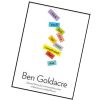10 Software Books That Separate Experts from Amateurs
Ken Schwaber, Hilary Mason, and Joel Spolsky recommend these Software Books to elevate your coding and engineering skills.





What if the books you choose to read could make the difference between writing code that just works and software that lasts? Software development is evolving rapidly, yet the foundations remain crucial. Ken Schwaber, co-creator of Scrum, and Hilary Mason, a renowned data scientist, both turn back to certain texts to ground their practice. Joel Spolsky, co-founder of Stack Overflow, also highlights foundational books that shaped his approach to software craftsmanship.
Ken Schwaber calls The Pragmatic Programmer a key step toward professionalism, emphasizing disciplined craftsmanship. Hilary Mason finds joy in Automate the Boring Stuff with Python for its practical wins that turn tedious tasks into automation triumphs. Joel Spolsky champions classic principles that keep developers grounded amid technological change.
While these expert-curated books provide proven frameworks, readers seeking content tailored to their specific skill level, goals, or professional domain might consider creating a personalized Software book that builds on these insights and fits your unique learning path.
Recommended by Ken Schwaber
Co-creator of Scrum, Scrum.org Founder
“To participate in the next generation of professional product delivery you have to be pragmatic but disciplined. Otherwise, you are fated to be ungrounded dreamers whose products endanger people and whose ideas never become successfully integrated into the world. Andy and Dave described a pragmatic but disciplined approach which is a key step towards professionalism.”
by David Thomas, Andrew Hunt··You?
by David Thomas, Andrew Hunt··You?
The Pragmatic Programmer, written by David Thomas and Andy Hunt, emerged from their extensive experience consulting and educating within the software community, seeking to reshape how developers approach their craft. You’ll explore how to fight software rot, write flexible code, and embrace continuous learning, with clear advice on avoiding pitfalls like duplicating knowledge and programming by coincidence. Practical chapters cover topics such as concurrent code challenges, security, and effective testing, making it ideal for both new coders and seasoned programmers aiming to refine their skills. If you want to deepen your understanding of software craftsmanship and take responsibility for your professional growth, this book offers a grounded, thoughtful path forward.
Recommended by Hilary Mason
Data scientist and founder
“The best part of programming is the triumph of seeing the machine do something useful. Automate the Boring Stuff with Python frames all of programming as these small triumphs; it makes the boring fun.”
by Al Sweigart··You?
When Al Sweigart discovered the frustration of repetitive computer tasks, he wrote this book to show you how to use Python to automate them efficiently. You’ll learn specific skills like scraping web data, manipulating Excel and CSV files, sending automated emails, and handling PDFs, all explained clearly for complete beginners. The book’s step-by-step projects, such as automating spreadsheet updates or renaming files, make programming accessible even if you’ve never coded before. If you want to save time by letting your computer handle tedious chores, this practical guide is tailored for you, especially if you're new to software development and eager to build useful automation tools.
by TailoredRead AI·
by TailoredRead AI·
This personalized Python Project Guide provides a tailored framework for developing practical software applications through hands-on projects. It focuses on project-based learning methodologies that adapt to your proficiency level and specific goals, whether you're aiming to build web apps, automate tasks, or explore data visualization. The book cuts through irrelevant generalities, delivering targeted strategies for structuring, coding, and troubleshooting real-world Python projects. It addresses key areas such as project planning, modular design, and debugging techniques with a tailored approach that fits your context and accelerates skill acquisition. This guide serves as a pragmatic bridge between theoretical Python concepts and effective application development.
Recommended by Brian Leroux
Cofounder @begin; AWS Serverless Hero; Web Developer
“Brilliant read by @isntitvacant exploring our craft dovetails nicely with Dave Farley's book which I feel is the best insight we have to define the term 'software engineering'” (from X)
What if everything you knew about software engineering was wrong? David Farley challenges common assumptions by focusing on managing complexity and fostering continuous learning rather than rigid processes. You’ll gain insight into choosing tools wisely, evaluating progress beyond legacy code, and embracing empiricism to build better, faster software. The chapters on incremental progress and balancing rigor with flexibility offer tangible frameworks you can apply immediately. This book is best suited for software professionals seeking to improve their craft with durable principles rather than quick fixes.
by Vlad Khononov··You?
When Vlad Khononov first rethought the connection between software architecture and business goals, he challenged the usual tech-first mindset. Drawing from over two decades as a software engineer and architect, Vlad guides you through domain-driven design (DDD) as a way to deeply understand business domains and align your software accordingly. You’ll learn to analyze a company’s strategy, decompose systems into bounded contexts, and coordinate teams to build software that truly supports business needs. This book suits software developers and architects eager to bridge the gap between code and business strategy without getting lost in abstract theory.
by Eric Matthes··You?
Eric Matthes is a high school science and math teacher who has been programming since childhood, bringing a hands-on educational approach to this third edition of Python Crash Course. You’ll start by mastering fundamental programming concepts such as variables, classes, and loops, with each chapter offering exercises to reinforce clean coding habits. The book guides you through creating projects like a Space Invaders–inspired arcade game and data visualizations using libraries like Matplotlib and Plotly, ending with deploying a simple web app built with Django. It’s designed for anyone eager to write real Python programs quickly, especially beginners who appreciate learning by doing rather than abstract theory.
by TailoredRead AI·
by TailoredRead AI·
This personalized book offers a tailored approach to automating routine tasks using Python scripting, focusing on practical frameworks that align with your workflow and proficiency level. It provides methodologies for identifying repetitive processes, designing efficient Python scripts, and integrating automation seamlessly into daily operations. The content cuts through irrelevant advice by fitting your specific industry context and goals, addressing challenges unique to your environment. It explores scripting strategies for file management, data handling, and task scheduling, emphasizing adaptable solutions that evolve with your needs. By focusing on implementation, it bridges foundational Python concepts with targeted automation techniques for tangible productivity gains.
Recommended by Joel Spolsky
Co-Founder of Stack Overflow and Trello
by Andrew Hunt, David Thomas··You?
by Andrew Hunt, David Thomas··You?
When Andrew Hunt and David Thomas first realized that software development was becoming fragmented by excessive specialization, they crafted a book that refocuses on the fundamentals of crafting reliable, adaptable code. You’ll gain concrete skills like fighting software rot, avoiding duplicated knowledge, and using contracts and assertions to bullet-proof your programs. The book also dives into capturing real requirements and automating testing to improve precision. Its self-contained chapters, filled with practical examples and analogies, make it approachable whether you’re just starting or have years of experience, helping you build maintainable software that truly delights users.
Recommended by Nicholas C. Zakas
Creator of ESLint, software developer
“This is exactly what a Linux beginner needs to get up to speed quickly. The book goes beyond simply walking through all of the command line utilities, and ventures into the realm of theory and how things work together.”
by William Shotts··You?
by William Shotts··You?
After decades of software development and Linux expertise, William Shotts offers a thorough introduction to the Linux command line that goes far beyond a simple utility walkthrough. You’ll learn core skills like file management, shell scripting, and text processing, along with the underlying philosophy connecting these tools to Unix traditions. Chapters on Vi editing and process management deepen your practical grasp, making it ideal if you want to move past graphical interfaces and understand your system’s inner workings. This book suits beginners who want a strong foundation as well as intermediate users aiming to sharpen their command line fluency.
Recommended by Ben Goldacre
Doctor and academic at Oxford CEBM
“I've read the first half, this book is an excellent thoughtful description of the culture / practice of open source software projects, interesting to me as relevant to other forms of mass technical collaboration (like health data science where not sharing code is somehow ok!)” (from X)
Nadia Eghbal, a researcher with years of experience at GitHub, wrote this book after deeply exploring how open source software development shapes our digital landscape. You learn about the lifecycle of open source projects, including the unseen maintenance work and the evolving role of individual creators in online communities. For example, she discusses how platforms like GitHub and social media redefine collaboration and audience interaction, providing insights into the costs and structures behind software many depend on. If you want to understand the social and technical dynamics behind open source and creator culture, this book offers a clear, grounded perspective.
by James Holler··You?
Unlike most software guides that skim the surface of Microsoft Office tools, James Holler's book digs deep into the practical use and hidden features of nine major Office 365 programs, including Excel, Word, and Teams. Drawing from over a decade as an IT consultant, Holler noticed how many users waste time due to superficial knowledge, so he crafted this extensive manual to help you unlock the full potential of these applications. You’ll learn not just basic functions but also shortcuts, program differences, and when to choose each tool for specific tasks, with clear explanations suited for beginners and advanced users alike. This book is especially beneficial if you aim to improve workplace efficiency and eliminate repetitive errors.
Recommended by BookAuthority
“One of the best Software Design books of all time”
Cory Althoff draws from his journey teaching himself programming to becoming a software engineer at eBay and later an executive at CompTIA. You’ll learn not only Python coding but also critical tools and concepts often missing from formal education, like Git, Bash, and core computer science fundamentals. The book breaks down professional programming into five clear sections, guiding you from your first line of code to acing technical interviews. If you’re aiming to transition from hobbyist to professional developer, this guide lays out what truly matters beyond syntax—teamwork, best practices, and career readiness.
Get Your Personal Software Strategy in 10 Minutes ✨
Stop following generic advice. Get Software strategies tailored to your goals and skill level without reading dozens of books.
Join 15,000+ Software enthusiasts who've personalized their approach
Conclusion
These 10 books converge on themes of practical craftsmanship, continuous learning, and bridging theory with real-world software challenges. If you're new to programming, starting with Python Crash Course and Automate the Boring Stuff with Python can give you hands-on skills quickly. For architects and engineers focused on systems and business alignment, Learning Domain-Driven Design and Modern Software Engineering offer nuanced guidance.
Rapidly integrating these insights into your workflow? Combine The Pragmatic Programmer with The Linux Command Line to build both your soft skills and technical fluency. Open source enthusiasts will appreciate Working in Public to navigate community dynamics.
Once you've absorbed these expert insights, create a personalized Software book to bridge the gap between general principles and your specific situation. Your next breakthrough might just be a tailored read away.
Frequently Asked Questions
I'm overwhelmed by choice – which book should I start with?
Start with Python Crash Course if you're new to programming; its hands-on projects build confidence quickly. If automation interests you, Automate the Boring Stuff with Python offers immediate practical value. These lay a solid foundation before you dive into more advanced topics.
Are these books too advanced for someone new to Software?
Not at all. Several books like Python Crash Course and Automate the Boring Stuff are designed for beginners. Others, such as Modern Software Engineering, suit experienced developers seeking to refine their craft. You can pick based on your current level.
What’s the best order to read these books?
Begin with practical programming like Python Crash Course, then explore automation with Automate the Boring Stuff. Next, deepen architectural understanding with Learning Domain-Driven Design and Modern Software Engineering. Sprinkle in The Pragmatic Programmer throughout to hone craftsmanship.
Should I start with the newest book or a classic?
Both have value. Classics like The Pragmatic Programmer remain relevant for timeless principles. Newer books, such as Modern Software Engineering, emphasize current practices. A blend helps balance foundational knowledge with evolving trends.
Do these books assume I already have experience in Software?
Some do, like Learning Domain-Driven Design and Modern Software Engineering, which target practicing developers and architects. Others, like The Self-Taught Programmer, welcome self-learners at all stages, guiding them from basics to professional skills.
How can I apply these expert books to my unique software goals?
Great question! While these books offer solid frameworks, personalized content can focus on your specific goals, skill level, and profession. Consider creating a personalized Software book to complement these insights with tailored guidance that fits your journey perfectly.
📚 Love this book list?
Help fellow book lovers discover great books, share this curated list with others!
Related Articles You May Like
Explore more curated book recommendations









